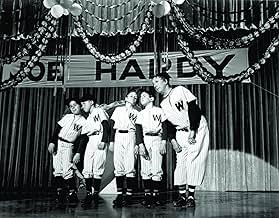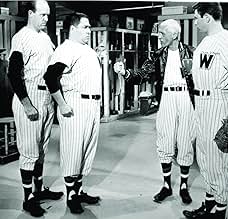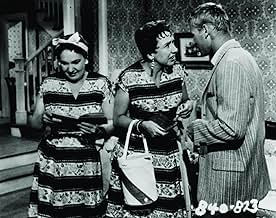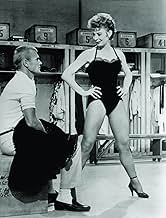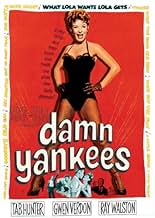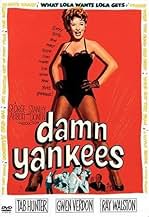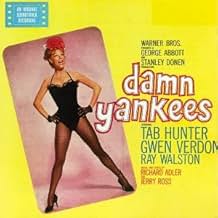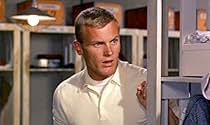CALIFICACIÓN DE IMDb
7.0/10
3.7 k
TU CALIFICACIÓN
Un fanático frustrado de los desesperados senadores de Washington hace un pacto con el diablo para ayudar al equipo de béisbol a ganar el banderín de la liga.Un fanático frustrado de los desesperados senadores de Washington hace un pacto con el diablo para ayudar al equipo de béisbol a ganar el banderín de la liga.Un fanático frustrado de los desesperados senadores de Washington hace un pacto con el diablo para ayudar al equipo de béisbol a ganar el banderín de la liga.
- Dirección
- Guionistas
- Elenco
- Nominado a 1 premio Óscar
- 8 nominaciones en total
Roy Sievers
- Joe Hardy - #2 - Washington Senators
- (material de archivo)
William Adams
- Yankees Team Owner
- (sin créditos)
Phil Arnold
- Newsstand Proprietor
- (sin créditos)
Robert Banas
- Baseball Player
- (sin créditos)
Benjie Bancroft
- Trial Spectator
- (sin créditos)
John Barton
- Baseball Game Spectator
- (sin créditos)
Yogi Berra
- Self - New York Yankee
- (material de archivo)
- (sin créditos)
Opiniones destacadas
Gwen Verdon was a Broadway legend with long gorgeous legs and an undeniable stage and screen charisma. Her legendary stage career earned her four Tony Awards, thanks in no small part to her long time Svengali and ex-husband Bob Fosse. Sadly, the only time Verdon was allowed to bring a role she created on Broadway to the big screen was in DAMN YANKEES, a sparkling film adaptation of the Richard Ross-Jerry Adler musical about a middle-aged baseball fan named Joe Boyd (Robert Shafer)who sells his soul to the devil for his favorite team, the Washington Senators, to win the pennant. The devil, apparently in desperate need of converts, appears in Joe's living room in the form of a Mr. Applegate (Ray Walston)and changes Joe Boyd into Joe Hardy (Tab Hunter), a young and unbeatable baseball player who helps lead the Senators to the pennant until he starts to get homesick and Applegate sends in his # 1 agent/witch named Lola (Verdon) to distract Joe. The film is well-mounted by Broadway legend George Abbott and Verdon and Ralston effectively reprise their Tony-Award winning stage roles and Fosse is even showcased, dancing in a rare duet with wife Verdon on "Who's Got the Pain?" and trust and believe, seeing Fosse and Verdon dance together is worth the price of admission alone. Other great songs in the score include "Whatever Lola Wants", "Heart","Those Were the Good Old Days", and "Shoeless Joe From Hannibal Mo". Not the greatest musical ever made, but Verdon, Ralston, and Fosse's brilliant choreography make it worth watching and re-watching.
This musical, when revived about a decade ago with Jerry Lewis as Applegate, was referred to as a fable for the Eisenhower Years. It is set in a faintly comfortable period (once the McCarthyite Persecutions were finished), because the concept of this musical was the preoccupation of the American public with the national pastime of baseball, and it's singular domination (between 1947 and 1962) by the New York Yankees. Although the Yankees had had other periods of greatness, with Ruth, Gehrig, "Murderers Row" in the late 1920s and early 1930s, they had to share the domination of the World Series with other teams in that period (the Philadelphia Athletics, the Detroit Tigers, and the St. Louis Cardinals, to name three). But the Yankees in this period started with Joe DiMaggio, entered into the period dominated by Mickey Mantel, Whitey Ford, Billy Martin, Yogi Berra, Phil Rizzuto, Don Larsen, Roger Maris, and presided over by Casey Stengel. They did not always win (one memorable defeat was by their perennial enemy the Brooklyn Dodgers in 1955), but they won so often that to non-baseball fans it was monotonous to follow the sports news: you knew what should finally happen.
So the background of this baseball era is important to understand the musical (one of the few times the actual historical background of the time the musical was created becomes that important). Joe Boyd (Robert Shafer) is a fanatical baseball lover and fan of the woebegone Washington Senators (the saying for many years about the Senators was, "First in war, first in peace, and last in their league."). The team had only one great moment: in 1924 they won the World Series when the team had one of baseball's greatest players on it - Walter Johnson. But it never really was in competition again after that. But Boyd is a fan, and he makes the mistake of being willing to sell his soul to allow the Senators a chance to win the series again. Enter Mr. Applegate (a.k.a. the Devil) played fiendishly well by Ray Walston. He offers Joe a contract that will make Joe the greatest baseball player of all time - and lead to the world series - in return for his soul. Hesitant at first, Joe agrees. He is transformed into Joe Hardy (Tab Hunter), and proceeds to try to join the Senators (with Applegate as his agent).
The Devil can never be trusted in any agreement. Applegate hopes to cause a wave of hope and hysteria by the anti-Yankee baseball public, letting Joe lead his team to the World Series. He plans to pull the rug from underneath the team at the final moment. Unfortunately Joe is a good salesman on his own, and has insisted on an escape clause for himself. Applegate has to accept it for the sake of his own plans. The escape clause is there because Joe loves his wife Meg (Sharon Bolin) and does not want her to be hurt. So Applegate decides to recruit his best female agent, Lola (Gwen Vernon) to vamp Joe and make him forget Meg. But Joe is too faithful, and succeeds in overcoming Lola's "irrisistable" personality (as she sings, "Whatever Lola wants, Lola gets" - except here). Lola, shaken by the experience, becomes a type of groupie for Joe - and eventually starts a mini-revolt on her own against Applegate.
The score of the show is memorable. Besides the key song "Heart" (sung by the Washington team players), and Lola's "Whatever" number, there is also "Two Lost Souls", "Goodbye Old Girl" and Walston's wonderful "Those were the good old days!" (when he fondly recalls all the tragedies he created in the history of mankind - including the day Jack the Ripper was born). Walston was not nominated for any awards for the movie performance*, but his Applegate is one of his best film performances, with his Gillis in SOUTH PACIFIC. He had played both on Broadway first, so we are lucky to have his film performances here.
*(But won the Tony Award for the role on stage.)
Stanley Donan co-directed this film with George Abbott. Abbott was usually a stage director (he had done the musical on Broadway). There is a moment when it is apparent that he is directing. There is a small dance done by one of the three ball players in the "Heart" number, and the close-up of the player as he smiles shyly and steps forward is out of place in the film - but would have worked on stage.
So the background of this baseball era is important to understand the musical (one of the few times the actual historical background of the time the musical was created becomes that important). Joe Boyd (Robert Shafer) is a fanatical baseball lover and fan of the woebegone Washington Senators (the saying for many years about the Senators was, "First in war, first in peace, and last in their league."). The team had only one great moment: in 1924 they won the World Series when the team had one of baseball's greatest players on it - Walter Johnson. But it never really was in competition again after that. But Boyd is a fan, and he makes the mistake of being willing to sell his soul to allow the Senators a chance to win the series again. Enter Mr. Applegate (a.k.a. the Devil) played fiendishly well by Ray Walston. He offers Joe a contract that will make Joe the greatest baseball player of all time - and lead to the world series - in return for his soul. Hesitant at first, Joe agrees. He is transformed into Joe Hardy (Tab Hunter), and proceeds to try to join the Senators (with Applegate as his agent).
The Devil can never be trusted in any agreement. Applegate hopes to cause a wave of hope and hysteria by the anti-Yankee baseball public, letting Joe lead his team to the World Series. He plans to pull the rug from underneath the team at the final moment. Unfortunately Joe is a good salesman on his own, and has insisted on an escape clause for himself. Applegate has to accept it for the sake of his own plans. The escape clause is there because Joe loves his wife Meg (Sharon Bolin) and does not want her to be hurt. So Applegate decides to recruit his best female agent, Lola (Gwen Vernon) to vamp Joe and make him forget Meg. But Joe is too faithful, and succeeds in overcoming Lola's "irrisistable" personality (as she sings, "Whatever Lola wants, Lola gets" - except here). Lola, shaken by the experience, becomes a type of groupie for Joe - and eventually starts a mini-revolt on her own against Applegate.
The score of the show is memorable. Besides the key song "Heart" (sung by the Washington team players), and Lola's "Whatever" number, there is also "Two Lost Souls", "Goodbye Old Girl" and Walston's wonderful "Those were the good old days!" (when he fondly recalls all the tragedies he created in the history of mankind - including the day Jack the Ripper was born). Walston was not nominated for any awards for the movie performance*, but his Applegate is one of his best film performances, with his Gillis in SOUTH PACIFIC. He had played both on Broadway first, so we are lucky to have his film performances here.
*(But won the Tony Award for the role on stage.)
Stanley Donan co-directed this film with George Abbott. Abbott was usually a stage director (he had done the musical on Broadway). There is a moment when it is apparent that he is directing. There is a small dance done by one of the three ball players in the "Heart" number, and the close-up of the player as he smiles shyly and steps forward is out of place in the film - but would have worked on stage.
I bought this movie not knowing what to expect. The only things I knew were that I LOVED Bob Fosse's choreography from films I had seen previously (Sweet Charity, Cabaret) and I loved to hear Gwen Verdon sing (Sweet Charity soundtrack). This movie was in no way, shape or form a waste of my 14 dollars and 99 cents! Ray Walston (reprising his Broadway role) is delightfully evil as the Devil himself (cleverly disgusing himself as a "Mr. Applegate") who has a warped mind and twisted sense of humor, which is evident in his song "The Good Ol' Days." Tab Hunter is superb as Joe Hardy (or "Shoeless Joe From Hannibal Mo."), the man who sells his soul to become the best long hitter there is, and help his favorite team, the Washington Senators, win the pennant and beating the "damn Yankees." To me, the real star here though, is Gwen Verdon as the seductress, Lola. Not only can this woman act wonderfully, but she has a beautiful singing voice (with a throaty, grainy yet girlish quality) and she is an absolutely FANTASTIC dancer (she's the living embodiment of Fosse's work)! She is the most wonderful dancer/singer/actress ever to grace the Broadway stage and films... it's such a shame they didn't let her play Charity in 1969's Sweet Charity (though Shirley MacLaine did do a good job in the role). She has absolutely become my hero, role model, and favorite actress of all time. Go Gwen! Go Damn Yankees!
All I'm going to do here is rave about a Broadway Legend. We have to be grateful for film, because otherwise some of the theater's greatest performers would exist only in memory. The film version of the 1955 Broadway smash is definitely Gwen Verdon's most memorable screen appearance - as the movie of CALL ME MADAM is probably the closest film approximation we have to what Ethel Merman was like on-stage, so DAMN YANKEES is for Gwen Verdon. No other film performance captures her presence and sparkle, the incredible movements her body was capable of - she's at her best here, and viewers familiar only with the comic roles she played later in her career will be amazed at this consummate musical comedy performer. She's completely infectious and delightful, even when she's not singing or dancing - the lady had PRESENCE, and she displays enough vulnerability to make us like a character who doesn't always do very likable things. She's elegant as she matter-of-factly explains her work methods in "A Little Brains, A Little Talent" and has a whopper of a dance duet with Bob Fosse called "Who's Got the Pain?" (they weren't married yet, but she was already becoming his favorite instrument of dance; his was a cameo appearance added to the film - on stage Verdon's partner was another of the show's characters - if you listen closely you'll hear Tab Hunter say "That was wonderful, Fosse!" at the number's conclusion). And she looks gorgeous in a series of colorful costumes, although in her signature number, "Whatever Lola Wants..." the costume grows skimpier and skimpier as she increases her efforts to seduce Tab Hunter. In THE BLUE ANGEL Marlene Dietrich's "Naughty Little Lola" used a chair as a prop to sing about "Falling in Love Again," (which would resonate decades later as Liza Minnelli sang about "Mein Herr")- in DAMN YANKEES Verdon uses a locker-room bench, and this "other Naughty Lola" ends up almost as scantily dressed! A word about Ray Walston's Mr. Applegate: He is NOT a nice guy!
If nothing else, this film version of the hit Broadway play allows viewers to see some of what made Verdon famous. Unfortunately, there isn't a great deal else that's memorable. When retiree Shafer has had his fill of the poorly-playing Washington Senators baseball team, he sells his soul to the Devil (who comes to earth in the human form of Walston) and transforms into a young, super-hitter (Hunter) who can help them win the pennant. He's bright enough to insert an "out clause" in his agreement, so Walston brings up temptress Verdon to make sure he doesn't take that opportunity when the time comes. Meanwhile, Shafer's wife frets over where he's gone, kept company by a pair of flighty sisters who keep their noses firmly planted in everything. In translating this to film (utilizing a larger number than usual of the original cast), the directors somehow managed to dull things down and give the film an aura of stagnation when it ought to be bursting with energy and vitality. Shafer's (purposefully?) drab house, with the planet's ugliest wallpaper, always looks just like a set. Ditto Walston's sparsely furnished lair. The locker room is nearly always filmed from the same angle, as it would have been seen from a theatre audience. Hunter is drop-dead gorgeous with a deep tan, cropped blonde hair and a charming. boyish grin. He is given very little to do, though. He hardly sings, tries to hold his own briefly in a group dance number, and (most dastardly of all) remains fully clothed while other, uglier baseball players take their shirts off or parade in a towel! Even Walston shows more skin than Hunter! Walston puts a lot of details and thought into his, by now, familiar role, but never really comes alive as much as one would like. It's difficult to believe that the Devil would choose this face and body to inhabit on earth. He also has remarkable trouble getting around (taxis?) Verdon (who doesn't even get to show her face until 45 minutes in) is remarkably vivid and captivating with several strong dance numbers. However, she looks far older than her 33 years (sometimes resembling an aged Greer Garson!) and has a surprising lack of chemistry with both Hunter and Walston. Only an idiot would say she's wrong for the part, but she may have been wrong for the film version. Attractive as she is, she just isn't the type of looker that would lure men to their doom. Other cast members include an authentically leathery Linville as the crusty baseball coach, Bolin as Shafer's drab wife, Allen as a loudmouthed reporter and Stapleton doing a head start on her Edith characterization from "All in the Family" and sporting what may be the ugliest hairdo in cinema history. There are a couple of numbers that stand out. One on a baseball field has inventive choreography with lots of dust getting kicked up. Verdon and choreographer (and future husband) Bob Fosse go for it in a variety show mambo. There's also a nightclub sequence with lots of the signature Fosse tableaux and moves. It's interesting to see his style developing and note the roots of his later, even more challenging, work. No one in the film can carry a tune particularly well. Vibrato is unheard of as various singers attempt to hold their shaky notes. Allen sings her entire song under the notes. So many times, viewers complain about films not being faithful to the source musical, but in this case, some more Hollywood tweaking may have helped! Sadly, a lot of gimmicky bits that may have been funny or new in 1958 are rather tiresome now, though it is amusing to see Walston put in coin after coin after coin into a pay phone in order to call Hell.
¿Sabías que…?
- TriviaGwen Verdon's dance partner in "Who's Got the Pain?" is Bob Fosse, who was restaging his stage choreography for the film, and took the opportunity to step into the number, which became a rare and treasured opportunity for Broadway fans to see the artist and his muse perform together. Verdon and Fosse married in 1960.
- ErroresWhen Joe is introduced to the manager and the reporter at the ballpark, there is a palm tree in the background, although the scene takes place in Washington DC.
- ConexionesFeatured in Diamonds on the Silver Screen (1992)
- Bandas sonorasSix Months Out of Every Year
Music by Richard Adler
Lyrics by Jerry Ross
Performed by Shannon Bolin, Robert Shafer, and chorus
Selecciones populares
Inicia sesión para calificar y agrega a la lista de videos para obtener recomendaciones personalizadas
- How long is Damn Yankees?Con tecnología de Alexa
Detalles
- Fecha de lanzamiento
- País de origen
- Idioma
- También se conoce como
- Damn Yankees
- Locaciones de filmación
- Productoras
- Ver más créditos de la compañía en IMDbPro
- Tiempo de ejecución
- 1h 51min(111 min)
- Relación de aspecto
- 1.85 : 1
Contribuir a esta página
Sugiere una edición o agrega el contenido que falta


